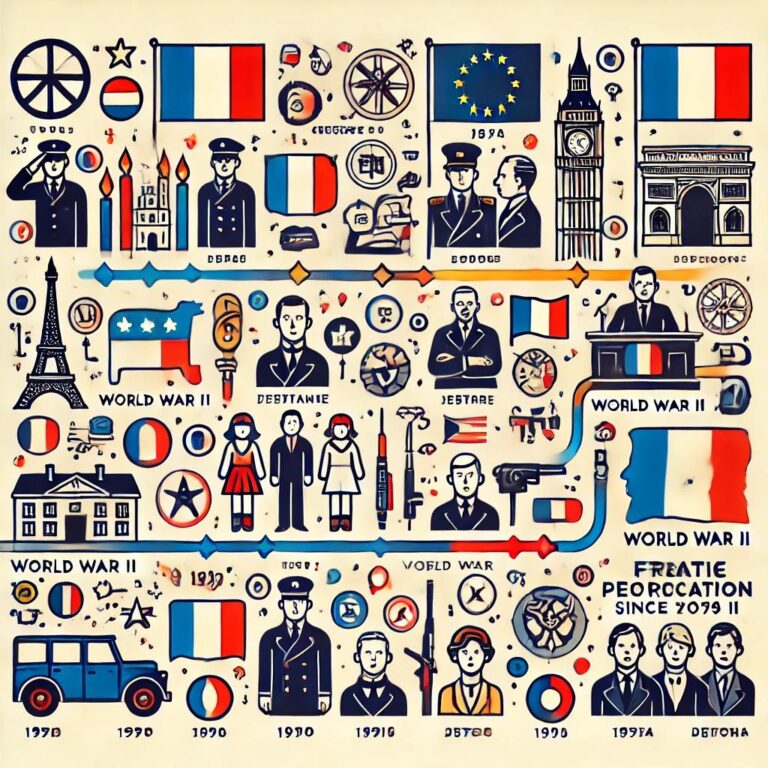
Introduction to French Decolonization
The decolonization era of France represents a significant chapter in both French and global history, marking a period where longstanding colonial ties were severed, leading to profound changes. This process, which unfolded predominantly in the mid-20th century, was characterized by a series of pivotal events and developments that collectively brought an end to French colonial rule. Understanding the timeline and key factors that catalyzed this transformation is crucial to comprehending its broader impacts.
The aftermath of World War II played a central role in initiating the decolonization process. The war had weakened European powers economically and militarily, thereby diminishing their ability to maintain control over distant colonies. France, like many other colonial powers, faced significant challenges in rebuilding its economy and military, creating a fertile ground for change. Additionally, the war fostered a heightened sense of nationalism and self-determination among colonized peoples, who had contributed significantly to the war effort and now demanded greater autonomy and independence.
Nationalist movements within the colonies emerged as powerful agents of change during this period. In Vietnam, the struggle for independence was spearheaded by the Viet Minh, leading to the First Indochina War against French forces. Similarly, in Algeria, the National Liberation Front (FLN) launched a brutal and protracted war of independence. These movements were characterized by their determination and capacity to mobilize popular support, challenging the legitimacy of French colonial rule and making continued domination increasingly untenable.
International pressure also played a crucial role in the decolonization of French territories. The establishment of the United Nations and the subsequent global emphasis on human rights and self-determination provided a platform for colonized nations to voice their aspirations for independence. Moreover, the Cold War dynamics further complicated the colonial question, as both the United States and the Soviet Union sought to align newly independent nations with their respective blocs, often supporting decolonization movements as part of their geopolitical strategies.
These factors, among others, collectively led to a wave of decolonization that swept across French territories, fundamentally altering the political landscape. The following sections will delve deeper into the specific economic, political, and social impacts of this transformative era.
Economic Consequences of Decolonization
The decolonization era significantly altered France’s economic landscape. With the loss of colonies, France was deprived of vast resources that had previously fueled its economic growth. These resources included raw materials such as minerals, agricultural products, and labor, which were integral to various French industries. The abrupt cessation of these supplies necessitated swift adjustments within the French economy.
Trade relationships underwent substantial modifications. Prior to decolonization, France had established preferential trade arrangements with its colonies, ensuring a steady flow of goods and services. The dissolution of these colonial ties compelled France to seek new trade partners and renegotiate existing agreements under less favorable terms. This shift often led to increased costs and competition, impacting the profitability of French enterprises.
In response to the changing economic environment, France implemented a series of economic policies designed to mitigate the adverse effects of decolonization. These policies included diversifying sources of raw materials, investing in domestic industries, and fostering economic partnerships within the European Economic Community (EEC), which later evolved into the European Union. Such measures aimed to stabilize the French economy and reduce dependence on former colonies.
Industries heavily reliant on colonial resources faced significant challenges. For instance, the textile and mining sectors, which depended on cheap raw materials from colonies, experienced a decline in production and profitability. This necessitated a transition towards more sustainable and self-sufficient practices. France also invested in technological advancements and infrastructure development to support this economic transformation.
Moreover, the post-colonial era saw a shift in labor dynamics. The end of colonial rule led to the repatriation of many French nationals who had been working in the colonies. This influx of labor required integration into the domestic job market, prompting changes in employment policies and social structures. At the same time, France witnessed an increase in immigration from former colonies, introducing new cultural and economic dimensions to the society.
Overall, the economic consequences of decolonization were multifaceted, prompting France to adapt and innovate in order to maintain economic stability and growth in the new global context.
Political Repercussions in France
Decolonization significantly impacted France’s political landscape, inducing profound changes in government policies and the emergence of new political movements. The withdrawal from colonial territories necessitated a reassessment of both domestic and foreign policies, leading to a period of political instability and fervent debates within the country.
One of the immediate effects was the shift in government priorities. The loss of colonies meant a reduction in economic resources and geopolitical influence, prompting French policymakers to focus more on internal development and European integration. This shift was evident in the formation of the Fifth Republic in 1958 under Charles de Gaulle, which sought to strengthen executive power and stabilize the political system.
Decolonization also catalyzed the rise of new political movements and parties. The period saw the emergence of the far-right National Front, which capitalized on nationalist sentiments and the perceived decline of French global stature. Concurrently, leftist movements gained traction, advocating for social justice and anti-imperialism. These divergent political forces contributed to a polarized political climate, reflecting the broader societal divisions exacerbated by decolonization.
The influence of decolonization extended to France’s foreign policy, which had to adapt to a new international order. France sought to maintain its global presence through the Francophonie, a community of French-speaking nations, and by engaging in new forms of international cooperation. This period also saw France adopt a more independent foreign policy stance, as exemplified by its withdrawal from NATO’s integrated military command in 1966.
Internally, the decolonization era was marked by political instability and contentious debates. Issues such as the treatment of former colonial subjects, the integration of immigrants, and the legacy of colonialism became central to political discourse. These debates often intersected with broader questions of national identity and France’s role in the world, leaving an enduring impact on the country’s political fabric.
Social Changes and Challenges
The decolonization era brought profound social changes and challenges to France, reshaping its societal landscape in myriad ways. One of the most significant impacts was the influx of immigrants from former colonies. This wave of immigration led to a more ethnically diverse population, which presented both opportunities and challenges for French society. The arrival of former colonial subjects necessitated a shift in how France approached integration and multiculturalism. Policies had to be crafted to accommodate the new demographic realities, which included educational reforms, housing policies, and labor market integration efforts.
However, the integration process was not without its difficulties. Racial tensions emerged as a pressing issue, fueled by economic disparities and social segregation. Immigrants often found themselves in marginalized communities, facing discrimination and limited access to resources. These tensions sometimes erupted into social unrest, highlighting the need for more inclusive and equitable policies. The French government had to navigate these challenges carefully, balancing the need for social cohesion with the realities of a diverse populace.
Culturally, the decolonization era prompted a redefinition of French identity. The blending of cultures from former colonies with traditional French customs led to a more pluralistic society. This cultural intermingling enriched the French cultural tapestry but also sparked debates about national identity and what it means to be French in a post-colonial world. The arts, cuisine, literature, and everyday social interactions began to reflect this new, diverse identity, challenging long-standing notions of cultural homogeneity.
The decolonization era thus marked a period of significant social transformation for France. It required the nation to confront and adapt to new demographic realities, address racial tensions, and redefine its cultural identity. These changes have had lasting impacts, shaping contemporary French society and its ongoing journey towards inclusivity and multiculturalism.
The Algerian War of Independence
The Algerian War of Independence, which spanned from 1954 to 1962, stands as one of the most significant and tumultuous conflicts during the decolonization era. Rooted in the desire for autonomy, the war was precipitated by long-standing grievances against French colonial rule, marked by economic exploitation, social inequality, and political disenfranchisement. The National Liberation Front (FLN) emerged as the principal force advocating for Algerian independence, employing guerrilla tactics and mobilizing widespread support among the population.
Major events of the war include the Battle of Algiers, which underscored the intensity of urban guerrilla warfare and the brutal counter-insurgency measures employed by French forces. The conflict saw widespread atrocities, including torture, summary executions, and mass detentions, leading to significant civilian casualties. The war’s human cost was staggering, with estimates of up to 1.5 million Algerians killed and millions more displaced. French military and civilian casualties also numbered in the tens of thousands, highlighting the profound human suffering on both sides.
The outcomes of the Algerian War were far-reaching. Politically, the war culminated in the Evian Accords of 1962, which granted Algeria independence and marked the end of 132 years of French colonial rule. The war’s aftermath profoundly affected Franco-Algerian relations, fostering a legacy of mistrust and unresolved historical grievances. Economically, Algeria faced the daunting task of rebuilding a nation ravaged by conflict, while France grappled with the loss of a significant part of its empire and the influx of pieds-noirs (European settlers) and Harkis (Algerian loyalists) who fled to France.
Socially, the war left deep scars, influencing national identities and collective memories in both countries. In Algeria, the struggle for independence became a cornerstone of national pride and identity, while in France, the war prompted soul-searching and reevaluation of colonial policies. The Algerian War of Independence thus stands as a pivotal chapter in the decolonization era, with enduring impacts on the political, economic, and social landscapes of both Algeria and France.
France’s Former Colonies: Post-Independence Trajectories
Upon gaining independence, France’s former colonies embarked on diverse trajectories influenced by historical, geographical, and socio-political contexts. Politically, many newly independent states encountered significant challenges in establishing stable governance. The initial euphoria of independence often gave way to internal strife, as nascent governments struggled with power vacuums and the legacies of colonial rule. For instance, countries such as Algeria and Vietnam experienced prolonged conflicts, while others like Senegal and Côte d’Ivoire pursued more stable political transitions.
Economically, the post-independence era was marked by efforts to achieve self-sufficiency and economic diversification. However, the transition was fraught with difficulties. Colonial economic structures, primarily designed to benefit the metropole, left many countries dependent on a narrow range of exports and ill-equipped to foster broad-based economic development. For example, the economies of countries like Mali and Chad remained heavily reliant on agricultural outputs, while oil-rich nations like Gabon and Congo-Brazzaville faced the challenges of resource dependency.
Socially, the impact of decolonization was profound, affecting everything from education systems to social stratification. Many former colonies endeavored to reclaim and promote indigenous cultures and languages, countering decades of French cultural dominance. Educational reforms were initiated to better reflect national histories and identities, though the influence of French language and culture remained pervasive. Social inequalities, often exacerbated during colonial rule, continued to pose significant hurdles to cohesive national development.
In the modern era, the relationship between France and its former colonies remains complex and multifaceted. Economic ties endure through trade, investment, and development aid, while political and military collaborations are also notable, as seen in France’s involvement in security operations in the Sahel region. Furthermore, the Francophonie, an international organization representing French-speaking countries, exemplifies the enduring cultural connections. This intricate web of interactions underscores the lasting legacy of France’s colonial past and the ongoing evolution of its post-colonial relationships.
The Role of International Organizations
International organizations played a pivotal role during the decolonization era of France, serving as arenas for debate, platforms for advocacy, and instruments of enforcement. The United Nations (UN) was at the forefront of this movement, providing a structured forum where colonial grievances could be aired and where resolutions supporting decolonization could be adopted. The UN Charter, particularly Chapter XI, emphasized the importance of self-determination, thereby providing ideological and legal backing for the decolonization efforts.
Throughout the decolonization period, numerous international treaties and conventions were instrumental. The Declaration on the Granting of Independence to Colonial Countries and Peoples, adopted by the UN General Assembly in 1960, marked a significant milestone. This declaration unequivocally stated that all people have the right to self-determination and demanded the swift and unconditional end to colonialism. France, as a UN member state, found itself under increasing international pressure to comply with these principles, which significantly influenced its policies regarding its colonies.
Support from global powers also played a crucial role. The Cold War context saw both the United States and the Soviet Union supporting decolonization movements, albeit for different ideological reasons. The United States, promoting democratic ideals, and the Soviet Union, in its anti-imperialist stance, both exerted pressure on France. This geopolitical dynamic further intensified the push for decolonization, as France had to navigate the complex interplay of international diplomacy and superpower interests.
France’s navigation through international diplomacy during this era was marked by both resistance and adaptation. While initially resistant to international pressure, France gradually adjusted its stance, recognizing the inevitability of decolonization. This shift was partly due to the pragmatic realization that maintaining colonies was increasingly untenable both economically and politically. The role of international organizations, therefore, was not merely passive; it actively shaped the trajectory of France’s decolonization process through legal frameworks, moral advocacy, and geopolitical pressures.
Legacy of Decolonization in Modern France
The decolonization era significantly influenced the trajectory of modern France, leaving a lasting legacy that continues to shape its society, politics, and international relations. The process of dismantling the French colonial empire, which spanned several continents, was fraught with complexities and repercussions that have reverberated through the decades.
One of the most profound impacts of decolonization is evident in the multicultural fabric of contemporary French society. The migration flows from former colonies to France have enriched the cultural landscape, contributing to the diverse and dynamic nature of modern French identity. However, this demographic shift has also brought challenges, such as integration and social cohesion, which remain pertinent issues in French politics and society.
The political arena in France has also been profoundly affected by its colonial past. The memories and legacies of colonial rule continue to influence political discourse and policy-making. Debates around immigration, national identity, and secularism often invoke historical contexts and colonial legacies, underscoring the enduring relevance of this period in shaping current political dynamics. Furthermore, France’s foreign policy and its relationships with former colonies are still influenced by historical ties and the need to address past injustices.
Internationally, France’s colonial history has shaped its role on the global stage. The country’s involvement in international organizations and its diplomatic relations with other nations are often viewed through the lens of its colonial past. This historical context informs France’s approach to international development, humanitarian aid, and its stance on global issues such as human rights and conflict resolution.
Ongoing debates about the colonial past highlight the need for reconciliation and a comprehensive understanding of history. Issues such as reparations, historical education, and the representation of colonial history in public spaces continue to spark discussions. These debates are crucial for addressing historical injustices and fostering a more inclusive and equitable society.
In conclusion, the legacy of decolonization is deeply embedded in the fabric of modern France, influencing its society, politics, and international relations. Addressing this legacy with sensitivity and a commitment to historical accuracy is essential for navigating the complexities it presents and for building a future informed by the lessons of the past.



